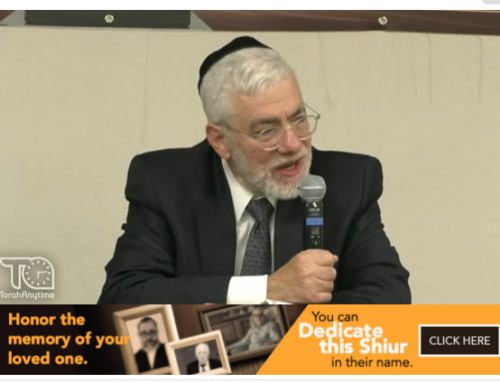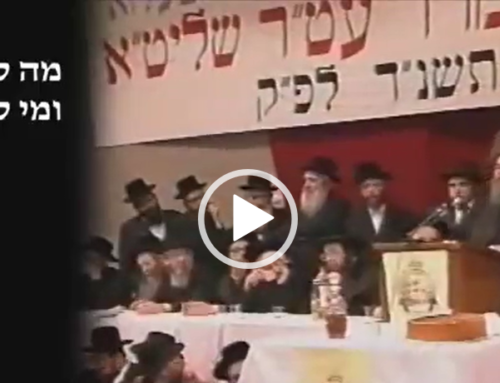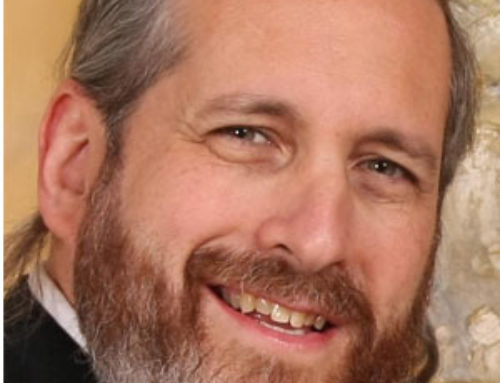By Tzvi Yaakovson
I once said to someone, “Show me another country in the world where the electronic signs on the buses, which identify the number of each bus and its destination, also wish passengers a gemar chasimah tovah.” That is something that you will not see anywhere else in the world.
On that note, here is an interesting tidbit, as we head toward Chanukah: This past week, every computer in the Knesset received a message from the Knesset Committee, which is responsible for the schedule of the Knesset. The committee met to discuss when the Knesset would begin its recess before Pesach and when the recess at the end of the summer session will begin. According to its decision, the current winter session will draw to a close on the 24th of Adar Sheini and the summer session will end four days before Tishah B’Av. The determining factors in this decision were the Yom Tov of Pesach in the spring and the Three Weeks in the summer. Is there any other parliament like this in the world?
In the same message, we were informed that next week, on the 7th, 8th and 9th of December, there will be a change in schedule at the Knesset. In general, the Knesset plenum is in operation three days a week: on Monday, Tuesday and Wednesday. On Mondays and Tuesdays, the Knesset convenes at 4:00 in the afternoon and deals with the daily agenda through the evening. At times, the session can end quite late at night. On Wednesdays, the Knesset meets at 1:00 and sometimes concludes its discussions at 6:00 or 7:00 in the evening.
But next week is Chanukah. On Monday, the Knesset sitting will begin at 1:00 instead of 4:00, and it will conclude at 4:00 regardless of what happens in the plenum. The sitting of the Knesset will be followed by a Chanukah candle-lighting ceremony in the Chagall Hall. On Tuesday, as well, the Knesset will convene at 1:00 and end its sitting no later than 4:00, so that the members of the Knesset can return home in time to light their Chanukah candles – even those who are particular about lighting at shekiah, which is at 4:35 in Israel next Tuesday. On Wednesday, the Knesset will open as usual at 11:00 and will conclude its operations at 1:00.
Finance Minister Kachlon: “Be’ezras Hashem”
On Wednesday two weeks ago, Finance Minister Moshe Kachlon presented the new state budget. He began his address by reading from a script: “Mr. Speaker, members of the Knesset, I am honored to bring the state budget for the years 2015 and 2016 before the Knesset for its approval. The state budget represents the foremost expression of our worldview and values…. Mr. Speaker, the state budget that I am placing on the Knesset table this evening brings news of the future to the citizens of Israel. It is a budget that sets a new national order of priorities. It makes it possible for us to raise the wages of soldiers performing their compulsory service, which is the price of our survival.”
It wasn’t a particularly dramatic speech. In fact, it was somewhat dry. The fact that it was read from a script didn’t help much. As he spoke, Kachlon noticed Yitzchok Herzog of the Zionist Camp walking out of the plenum, somewhat offended. “Buji, it isn’t very wise to criticize and then not listen to the answers,” Kachlon said.
Herzog replied, “I’m just going out for a drink of water.”
Kachlon said, “Then go ahead. You really do need water.” He continued his speech: “The budget will make it possible for us to raise the wages of our soldiers and to pay the price of our survival, to guarantee unemployment pay for the self-employed and to restore child allowances, in contrast to the past. Yes, my friends in the opposition, we are in favor of child allowances.”
“As are we,” Herzog responded.
“Where I grew up,” Kachlon said, “children were a blessing. For you, children are a burden.”
“That isn’t true,” Herzog protested. “Why are you saying that?”
MK Rosenthal of the Zionist Camp interjected. “You are full of empty talk! The allowances were cancelled by a majority of the Knesset!”
Kachlon said, “Gentlemen, I am speaking only about the facts… Tonight, with Hashem’s help, we will have a budget, and it is a responsible budget. 660 million shekels have been allocated to raise the wages of the soldiers who protect us. Their wages will be increased, with Hashem’s help, on the first of January – and we will try to make it even earlier than that – by over 50 percent. These are the wages of the soldiers performing compulsory service in the army; it is the cost of our survival. I must say that MK Amir Peretz has been trying for years to do this. Now, boruch Hashem, we have succeeded.”
Peretz (of the Zionist Camp, and a former Minister of Defense) said, “You should be blessed for helping the soldiers.”
Kachlon went on, “Boruch Hashem. We are moving on, and in everything, ‘we will act in Hashem’s Name and we will succeed.’ That is our message.”
The phrases “boruch Hashem” and “with Hashem’s help” are always on his tongue, and, as Chazal say, Hashem does not withhold the reward even for a good word.
“With Hashem’s help,” he continued, “we will market approximately 25,000 apartments by the end of the year, and 70,000 by the end of next year, at special low prices. And, my friends, the results of the tenders are not arbitrary. The fact that an apartment in Afula will now be sold for 620,000 shekels, instead of 900,000 or 950,000, is not by chance. Nor is it by chance that an apartment in Mutzkin will be placed on the market for 950,000 shekels instead of 1.3 million, and a home in Moshav Achisamach will be sold for 650,000 shekels instead of 900,000. With Hashem’s help, you will see the same in Rishon Letzion on December 7, and you will be surprised by the results in Rosh Ha’Ayin, and we will go through the cities one by one, with tenacity and determination, until we have solved the problem.”
There was much commotion in the Knesset plenum. All the legislators were there to participate in the vote and to hear the Finance Minister’s address. The Knesset Speaker, Yuli Edelstein, tried to silence the babbling voices and urged the lawmakers who were standing to take their seats. “Members of the Knesset, I ask for silence once again,” he announced. “Knesset members Gafni and Smotrich, please be seated. MK Miki Zohar, I have already asked you to sit down.”
As he gazed at the opposition benches, Kachlon remarked, “It is funny how people believe in something but have to vote for the opposite.”
Yechiel Chilik Bar of the Zionist Camp said, “You won’t convince us to go along with you.”
“No, it’s all right,” Kahlon responded. “I can’t convince you. I have also sat here, and I have said the same things. That is life, and it is all right. I have no grievances.”
Kachlon’s responses to the comments that interrupted his speech were not prepared in advance. From this point on, he continued to speak off the cuff, which made his address much more interesting: “Mr. Speaker and honored Knesset members, the Mishnah in Pirkei Avos says, ‘Know where you have come from and where you are going, and before Whom you will have to give an accounting.’ Mr. Speaker, I have sworn that I will never forget where I came from and I work with that in mind. Wherever it is necessary to aid the weaker citizens, we are there. I have been there and I will remain there throughout my life.”
The next day, Kachlon was to visit New York.
The Traffic Director
Speaking of Kachlon, here is a story that I may or may not have told in the past. Once, we were standing together outside the coffee machine in the room behind the Knesset plenum, and Kachlon told me that his mother was hospitalized at Hillel Yafeh Hospital in Chadera. His mother lived in Givat Olga, a neighborhood near Chadera. He told me that she was having difficulty breathing and had been placed on a respirator.
I remarked that if I were in his place, I would have had her transferred to a more qualified hospital, such as Hadassah in Yerushalayim or Tel Hashomer. “It doesn’t befit you to have her in Hillel Yafeh,” I said, adding, “Still, a mother is a mother, and I’m sure you have the ability and the connections to make sure that she gets the best possible care.”
Kachlon placed a hand on my shoulder and said, “It doesn’t befit me? These words don’t befit you! Who heals the sick, the doctors or Hashem?”
“You’re right,” I told him, “but we still have to do hishtadlus.”
In response, Kachlon told me the story of the man who would stand at the intersection at the entrance to Yerushalayim every day, “directing” the cars driving by. This man never imagined that the motorists were stopping and starting their cars based on the signals of the traffic light behind him. He was certain that his own hand signals were controlling the traffic. One morning, when he didn’t feel well and his wife suggested that he stay in bed, he was horrified. “Do you want there to be traffic jams blocking all the roads?” he demanded. “Do you know what kind of car accidents can happen if I don’t direct traffic?”
“You see,” Kachlon told me, “there are some people who think that they themselves run the world. I will tell you that only Hashem, not the doctors, can heal my mother. Therefore, it doesn’t make any difference if she is in Hillel Yafeh or in Tel Hashomer.”
Netanyahu’s Flights
There are some people in the State of Israel who feel a powerful need to fulfill the posuk that describes Eretz Yisroel as “a land that devours its inhabitants.” In the state in general, and in the political realm in particular, there are constant campaigns of harassment – which might be aptly labeled “witch hunts” – against various individuals. There also seems to be competition within the Israeli media as to who can destroy the most people, as if ruining reputations is the media’s raison d’etre and the proof of its effectiveness.
Why do I mention this? Because this week, the state ombudsman responded to Prime Minister Netanyahu’s request for an additional extension on responding to his report on Bibi Tours. This affair began in March 2011, in the wake of a report from the state ombudsman at the time. The suspicion was that certain foreign parties had funded a portion of Netanyahu’s trips abroad, and perhaps those of his family members as well, during his tenure as Minister of Finance. In December 2012, the current ombudsman delivered the material on the case to the government’s legal advisor to investigate if the facts that had been uncovered pointed to any criminal wrongdoing. In September 2014, the legal advisor found that there was no reason to suspect criminal activity and the materials were returned to the ombudsman so that he could conclude his usual review of every government office and official. The ombudsman prepared a report and sent a copy of it to the subject – in this case, Netanyahu – for his comments.
From September 2014 through August 2015, there was a steady exchange of comments and responses between the ombudsman and Netanyahu. In August, Netanyahu requested an extension on delivering his responses. He made the same request in October and now again in November. Netanyahu explained that the security situation in the country has prevented him from setting aside time to review the ombudsman’s reports and to respond to them.
Was this allowed to pass quietly? Absolutely not. Netanyahu’s request for an extension was dissected on the front pages of every newspaper, even though the state ombudsman himself agreed that the requests for extensions were perfectly reasonable, given the current circumstances.
What Are the Criminal Sanctions?
I have been making an effort to understand the “criminal sanctions” that have been the focus of so much discussion regarding the draft law. It has been written that Lapid’s draft law included criminal sanctions for yeshiva students, while the current law has no such stipulation. I examined the law itself, along with all the explanatory material that accompanies it, and I found not a single word on the subject. Finally, I decided to peruse the chareidi newspapers’ reports on the issue and I discovered that here, as in the case of the Givat Ze’ev shul, many words were written, albeit with little substance. In one of the daily papers, I found the following sentence on the front page: “The criminal sanctions included in the previous law have been cancelled.” I read through the entire article but found no further elucidation of the subject. In another newspaper, I found an interview with a legal expert who attempted to clarify the issue. The article said, “In other words, the accomplishment of the new law lies in the fact that criminal sanctions have not been imposed in a sweeping fashion on the entire Torah world.” Do you understand what that means? I certainly do not.
The reason for my interest in these “criminal sanctions” is that I am troubled by a question: Everyone knows that any yeshiva student who doesn’t receive a deferment of his military service through the Vaad Hayeshivos is classified as a deserter, with all the implications of that term. All army deserters, chareidim and chilonim alike, are hunted down, captured, imprisoned, and brought to court. How can “criminal sanctions” be avoided for someone who doesn’t get a deferment? Everyone to whom I have posed this question so far hasn’t known how to answer me. This week, I interviewed Yaakov Peri (in a separate article) and received a bit more of an explanation of the subject.
Finally, I found the following in the publicity materials of the opponents of the amended law: “No criminal sanctions have been cancelled. First of all, it must be emphasized that all the discussion of this subject stems from ignorance and a lack of familiarity with the matter. Anyone who talks about the ‘criminal sanctions clause’ doesn’t know what he is talking about and has never read the law.” According to the writer of that article, both the previous draft law and the current law stipulate that if the enlistment quotas are not met, all the yeshiva students will be required to enlist in the army. Those who are required to enlist and do not comply will be charged with a crime. The difference lies only in the numbers. The previous law set the deadline for the year 2017, while this law delayed it until 2020. On one hand, the decree has been postponed by several years, but on the other hand, the number of people who will be classified as deserters is likely to be much higher.
In short, no one understands much about this subject.
Lieberman Against Obama
John Kerry was not the only visitor to Israel this past week. Our country was also visited by Senator Joe Lieberman, who ran for vice president of the United States in the year 2000 and vied for the Democratic presidential nomination in 2004. Lieberman was the keynote speaker at an event at the University of Haifa. Naturally, his speech dealt with President Obama. “I won’t tell you that there is no potential for difficulty in the relationship,” he said, “but the good news is that among the general public in America, not just the Jewish population, support for Israel has remained very high.” Lieberman claimed that the personal relationship between President Obama and Prime Minister Netanyahu isn’t as adversarial as the media tries to make us believe, but “there is no doubt that they are not in the place they should be between such close allies.”
Lieberman is a Democrat in every sense, but that did not deter him from leveling criticism at Obama. “The goal of the foreign policy of the current president of the United States is to distinguish it from his predecessor’s foreign policy. His policy is that if the previous president brought us into wars, then President Obama would get us out of wars. That is an excellent idea, but if someone declares war on you, you can’t stay outside the situation. There is no doubt that ISIS has declared war on us, but Iran has also demonstrated the greatest degree of hostility they could possibly show.”
Lieberman also spoke harshly about Obama’s actions in Syria. He maintained that the initial rebels against Assad’s regime were not Islamic groups, but true Syrian patriots who despised Assad’s dictatorship. Their chances of success were severely hurt by the lack of support from America, which caused the situation to deteriorate and led to the massive numbers of refugees streaming out of the country today. “It isn’t too late,” Lieberman declared, “but it is very late. I believe that history will judge America’s involvement in Syria as the low point of Obama’s presidency, and I hope that the situation will yet change.”
Of course, Lieberman also spoke about American Jewry. “The Jews in America are divided into three groups. There is one group that will support Israel under any circumstances, another group that loves Israel but doesn’t turn a blind eye to things they disagree with, and a third group that is apathetic about Israel or even sees it as a negative. There has been an indisputable rise in the number of Jews associated with the third group, especially among those below the age of 40.”
In an interview with the media, Lieberman spoke particularly harshly about Obama. “I think that the Obama regime has done too little and has acted too late. The enemy must be liquidated. Certainly, the state that they declared must be destroyed. If we don’t do that, they will continue to perpetrate attacks as they did in Paris, and they will attack us in America as well. This must be done even if it means sending soldiers in to fight them, even though the American people are still licking their wounds from the military intervention in other Arab countries. America must lead the world’s fight,” he asserted.





